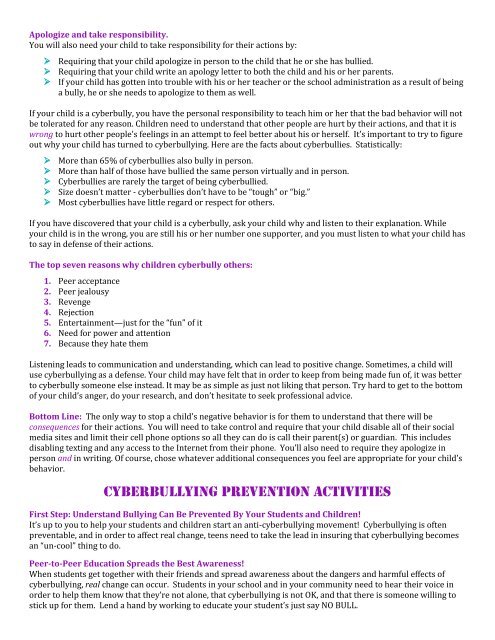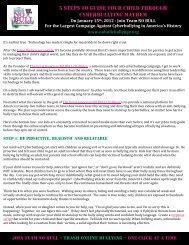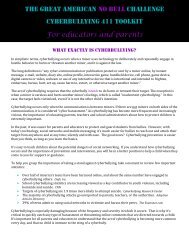The Great American NO BULL Challenge cyberbullying 411 toolkit ...
The Great American NO BULL Challenge cyberbullying 411 toolkit ...
The Great American NO BULL Challenge cyberbullying 411 toolkit ...
Create successful ePaper yourself
Turn your PDF publications into a flip-book with our unique Google optimized e-Paper software.
Apologize and take responsibility.<br />
You will also need your child to take responsibility for their actions by:<br />
Requiring that your child apologize in person to the child that he or she has bullied.<br />
Requiring that your child write an apology letter to both the child and his or her parents.<br />
If your child has gotten into trouble with his or her teacher or the school administration as a result of being<br />
a bully, he or she needs to apologize to them as well.<br />
If your child is a cyberbully, you have the personal responsibility to teach him or her that the bad behavior will not<br />
be tolerated for any reason. Children need to understand that other people are hurt by their actions, and that it is<br />
wrong to hurt other people’s feelings in an attempt to feel better about his or herself. It’s important to try to figure<br />
out why your child has turned to <strong>cyberbullying</strong>. Here are the facts about cyberbullies. Statistically:<br />
More than 65% of cyberbullies also bully in person.<br />
More than half of those have bullied the same person virtually and in person.<br />
Cyberbullies are rarely the target of being cyberbullied.<br />
Size doesn’t matter - cyberbullies don’t have to be “tough” or “big.”<br />
Most cyberbullies have little regard or respect for others.<br />
If you have discovered that your child is a cyberbully, ask your child why and listen to their explanation. While<br />
your child is in the wrong, you are still his or her number one supporter, and you must listen to what your child has<br />
to say in defense of their actions.<br />
<strong>The</strong> top seven reasons why children cyberbully others:<br />
1. Peer acceptance<br />
2. Peer jealousy<br />
3. Revenge<br />
4. Rejection<br />
5. Entertainment—just for the “fun” of it<br />
6. Need for power and attention<br />
7. Because they hate them<br />
Listening leads to communication and understanding, which can lead to positive change. Sometimes, a child will<br />
use <strong>cyberbullying</strong> as a defense. Your child may have felt that in order to keep from being made fun of, it was better<br />
to cyberbully someone else instead. It may be as simple as just not liking that person. Try hard to get to the bottom<br />
of your child’s anger, do your research, and don’t hesitate to seek professional advice.<br />
Bottom Line: <strong>The</strong> only way to stop a child’s negative behavior is for them to understand that there will be<br />
consequences for their actions. You will need to take control and require that your child disable all of their social<br />
media sites and limit their cell phone options so all they can do is call their parent(s) or guardian. This includes<br />
disabling texting and any access to the Internet from their phone. You’ll also need to require they apologize in<br />
person and in writing. Of course, chose whatever additional consequences you feel are appropriate for your child’s<br />
behavior.<br />
Cyberbullying Prevention Activities<br />
First Step: Understand Bullying Can Be Prevented By Your Students and Children!<br />
It’s up to you to help your students and children start an anti-<strong>cyberbullying</strong> movement! Cyberbullying is often<br />
preventable, and in order to affect real change, teens need to take the lead in insuring that <strong>cyberbullying</strong> becomes<br />
an “un-cool” thing to do.<br />
Peer-to-Peer Education Spreads the Best Awareness!<br />
When students get together with their friends and spread awareness about the dangers and harmful effects of<br />
<strong>cyberbullying</strong>, real change can occur. Students in your school and in your community need to hear their voice in<br />
order to help them know that they’re not alone, that <strong>cyberbullying</strong> is not OK, and that there is someone willing to<br />
stick up for them. Lend a hand by working to educate your student’s just say <strong>NO</strong> <strong>BULL</strong>.








